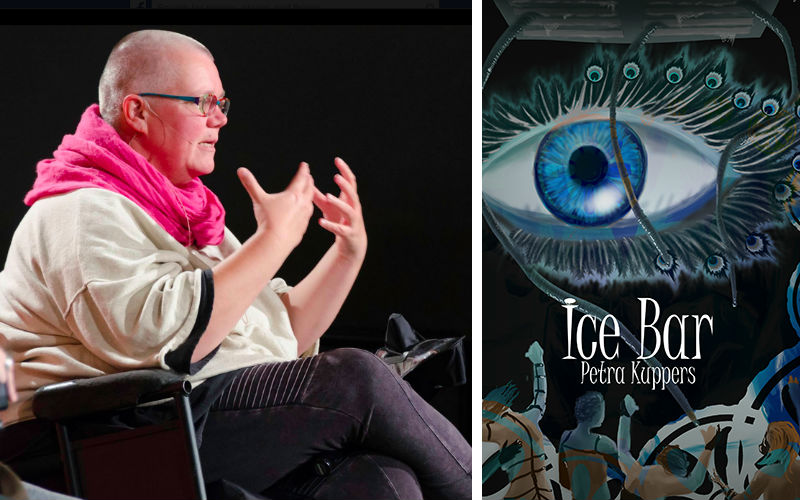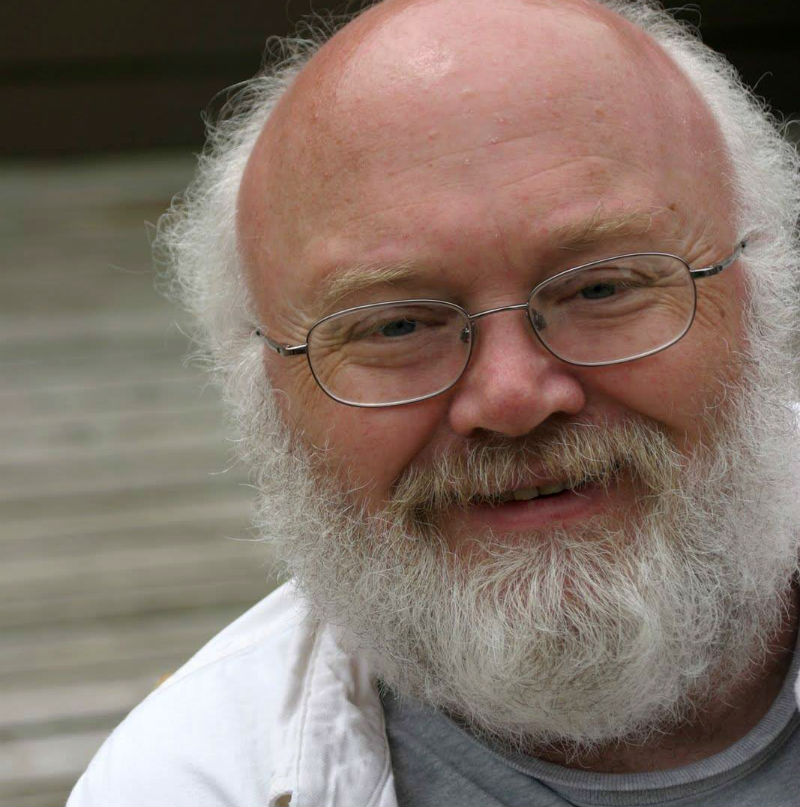Russell Brakefield explores music, myth, and Michigan in poems

Music and myth. Michigan and memory. These subjects course through Russell Brakefield’s first collection of poetry, Field Recordings, which was published this spring by Wayne State University Press. As a Michigan native, when I read his poems I feel the desperation of winter, the joy of berry picking in the summer, and the layers of time. These place-based, lyrical poems highlight the discordant notes of relationships, plans, hopes, and sleep.
Brakefield grew up in West Michigan, studied at Central Michigan University, and earned his M.F.A. in poetry at the University of Michigan in 2011. He taught at the University of Michigan following his M.F.A. and then also worked at Literati Bookstore in Ann Arbor starting in 2013. In 2017, he moved to Colorado and now teaches at the University of Denver, where he says he is learning a different landscape in the West.
Here, Brakefield shares his experiences in a bookstore and with reading and writing poetry, as well as what’s inspiring him and what’s next.
The Tea Is Lit: Arbor Teas Summer Reading Series

The first book about pouring hot water over cured leaves, The Classic of Tea, was written in 780 A.D. by Lu Yu. While it's ostensibly a how-to guide for cultivating and brewing the best teas, Yu couldn't resist waxing poetic over his shrubby beverage:
Tea can look like a mushroom in whirling flight just as clouds floating from behind a mountain peak. Its leaves can swell and leap as if they were lighting tossed on wind-disturbed water. Still others twist and turn like rivulets carved out be a violent rain in newly tilled fields.
Many writers have feted tea since then, from Lu Tung and Marcel Proust to Henrik Ibsen and Alexander McCall Smith, so Arbor Teas dipping its leaves into literature with its Summer Reading Series feels like a natural fit.
Since 2016, Arbor Teas has serialized fiction on its website each summer, beginning with Lauren Doyle Owens' lighthearted marriage drama The Wintree Waltz, continuing with David Erik Nelson's "till death do we part" sci-fi story Expiration Date, and this summer's historical novella An Exchange of Two Flowers by Sarah Zettel, who reads from her work on Monday, June 25 from 7-8:30 pm at AADL's downtown branch.
To find out how a family-owned organic tea company decided to start publishing fiction, I emailed with Arbor Teas' Lea Abbott.
Accessing the Future: Petra Kuppers' "Ice Bar" explores disability culture via speculative fiction

Themes of women, water, and power intertwine in delightful ways in Petra Kuppers’ latest book, Ice Bar, which features post-apocalyptic science fiction and psychedelic fantasy short stories where many of the characters are disabled in some way or another.
"They might use a wheelchair or have family members in psych wards or they themselves have been institutionalized," said Kuppers, a University of Michigan professor. "Normally in [these genres], disability is either erased or the person is made the bad guy. I wondered what would happen if I used a disability perspective to write my own stories in which [disability] is neither horrific nor celebratory but rather part of human life.”
Real Love: Beverly Jenkins writes romance fiction to tell African-American history

Beverly Jenkins wants to challenge your thoughts about romance fiction.
When her first book, Night Song, was published in 1994, there wasn’t a market for romance novels featuring people of color, and many African-American-focused novels centered on slavery. But Jenkins continued to pursue her vision of highlighting the love stories of black people, often set in the 19th century. Now, 37 novels later, the Detroit-raised Belleville resident is a superstar in romance fiction.
The prolific writer earned the celebrated Romance Writers of America Nora Roberts Lifetime Achievement Award in 2017, further cementing Jenkins' status as a legend in the romance market. But Jenkins isn't just about love stories. She has said she wants to show how black people in America have “turned their lemons into lemonade,” and Jenkins continues with her mission to educate folks about African-American history with her emphasis on Juneteenth, the holiday that commemorates the end of American slavery on June 19, 1865.
On Monday, June 18 at AADL's Malletts Creek branch, Jenkins will present "The Historical Background of Juneteenth" from 7:00 pm to 8:30 pm. During this event, Jenkins will talk about, educate, and celebrate this milestone in American history.
I had the pleasure of speaking to Beverly Jenkins about her literary influences, if men read her work, and the importance of providing love stories featuring minorities.
Culottes, Canes & "Calypso": David Sedaris at Literati

David Sedaris was his usual charming, generous self when gave a packed reading on Friday at Literati Bookstore in Ann Arbor in support of his new book of essays, Calypso. And, of course, he was hilarious, telling dirty jokes, cursing, and plotting revenge on his West Sussex neighbors.
In Calypso, Sedaris has returned to the humorous essay form with which he’s made his reputation. His siblings, parents, and boyfriend, Hugh -- familiar to long-time readers -- appear once again. But many of these essays are darker in subject and tone than Sedaris’s previous work. They describe aging, illness, and the unexpected death of his sister, among other things. In the book’s first sentence, Sedaris announces, “Though there’s an industry built on telling you otherwise, there are few real joys to middle age.”
Sedaris didn’t read that essay on Friday, but he did read the text of a commencement speech he recently gave at Oberlin College, which touched on similar themes. Encouraging young writers to pursue their vocation (at any cost), he said, “At 22 you are built for poverty and rejection. And you know why? Because you are so good looking.” He also said: “Be yourself. Unless your self is an asshole.”
Soul Mining: Emily Roll speaks from the heart

Considering her namesake, Emily Roll was destined to be a writer.
"I was named after Emily Dickinson and always felt a strong connection to her poetry," said Roll. "When I got older I started writing poetry of my own and later took an extensive experimental acting class and realized that making my poems three dimensional was when I really found my creative voice."
The 3D came as spoken-word stories and poems, a form that the Ann Arbor resident has been exploring since 2012. She recently posted a large body of her work to Bandcamp and it's surprisingly musical -- and not just because she sometimes backs her words with synths and throws in a few cover tunes. Roll's voice invites listeners into her intimate world akin to what a singer does with a ballad.
Scott W. Stern on Sex, Surveillance, and Suppression in "The Trials of Nina McCall"

You've probably never heard of the American Plan. It isn't something that is talked about in most college history classes or in high schools’ curricula. The name sounds benign at first glance -- maybe it was a plan to help Americans overcome some obstacle or temporary setback in life?
Except it wasn't.
The American Plan allowed local municipalities, law enforcement, and health agencies to round up women suspected of having sexually transmitted infections (STIs), assumed to be prostitutes, or just considered “promiscuous” and throw them in jail to "treat" them. The women rarely received the benefit of due process and were often imprisoned for years, exploited and subject to abuse.
Poet Keith Taylor reaches for ecstatic destinations

In his poems, Keith Taylor draws attention to what you might not notice and highlights its character and depth. In doing so, he does what identifying things by name achieves for him: helps us see and know living things, moments, scenes.
When he was working on a collection of poems, Marginalia for a Natural History, in his own form of eight nine-syllable lines, he serendipitously encountered a damselfly with a nine-syllable name. It was not just any insect but the ebony jewel-winged damselfly.
His personal discovery was in line with his view of writing poetry as a demand of gods in whom he doesn’t really believe. “Those gods again. They’re out there. They give you these things,” he said at the “Exit Interview with Keith Taylor and Cody Walker” event at Literati Bookstore on Friday, April 20. The event celebrated Taylor’s retirement from the University of Michigan this spring.
Pluto-cracy: Dr. Alan Stern & Dr. David Grinspoon's "Chasing New Horizons"

When the NASA spacecraft New Horizons did a Pluto driveby at 32,000 MPH on July 14, 2015, it was the first close-up view we had of our solar system’s most distant planet.
And yes, it's a full-blown planet, despite what you may have heard on Aug. 24, 2006, when Pluto was reclassified by astronomers as a “dwarf planet.”
Please do not try to tell planetary scientist Dr. Alan Stern otherwise.
“What the astronomers did was really a travesty; planetary scientists don’t buy that b.s.,” said Stern, whose new book, Chasing New Horizons: Inside the Epic First Mission to Pluto, recounts the spacecraft mission he led, which provided unprecedented photos and information about the Milky Way's tiny trouper. (He will be at AADL’s downtown branch on Thursday, May 10, at 7 pm.)
“We know what planets are, and if you go to planetary science meetings, Pluto is called a planet every single day,” Stern said. “Don’t follow what the astronomers do any more than if I tried to classify black holes as a non-expert. But the journalists who lapped it up in 2006, if that would have happened in the ‘90s, there would have never been a mission.”
Rescue 'Net: Common Language Bookstore might have been saved by a web post

The internet shows us the good, the bad, and the horrific of human nature.
You can find every kind of hate group imaginable, people telling other people to kill themselves, tweets that destroy your soul. It can be easy to forget that most people are good; it sometimes makes you want to throw your computer into the Huron River, rip the router out of the cabinet, and live under a tinfoil hat.
But every now and then something phenomenal happens.
Something like the thing that happened to Ann Arbor's Common Language Bookstore this past month.


































